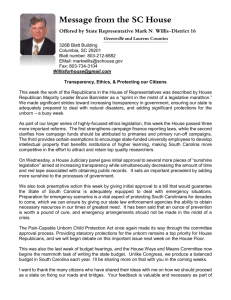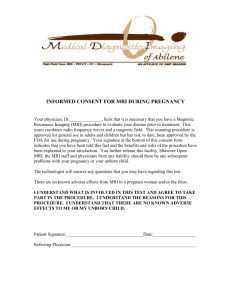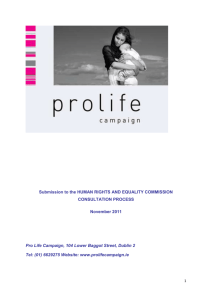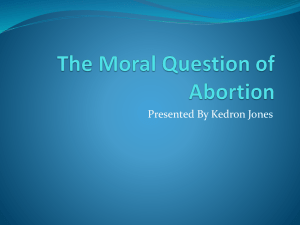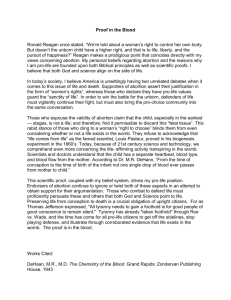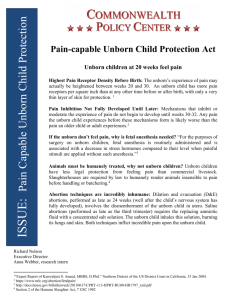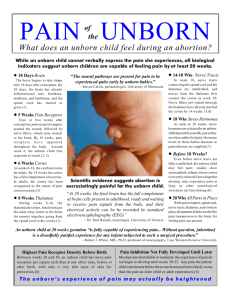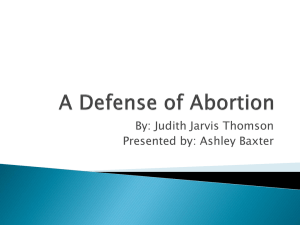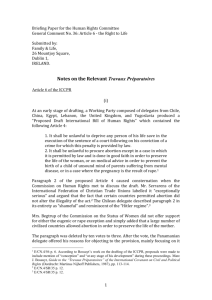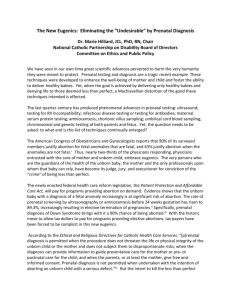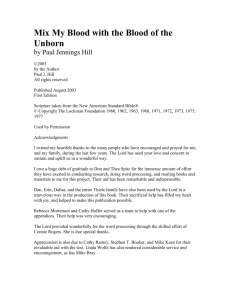File
advertisement
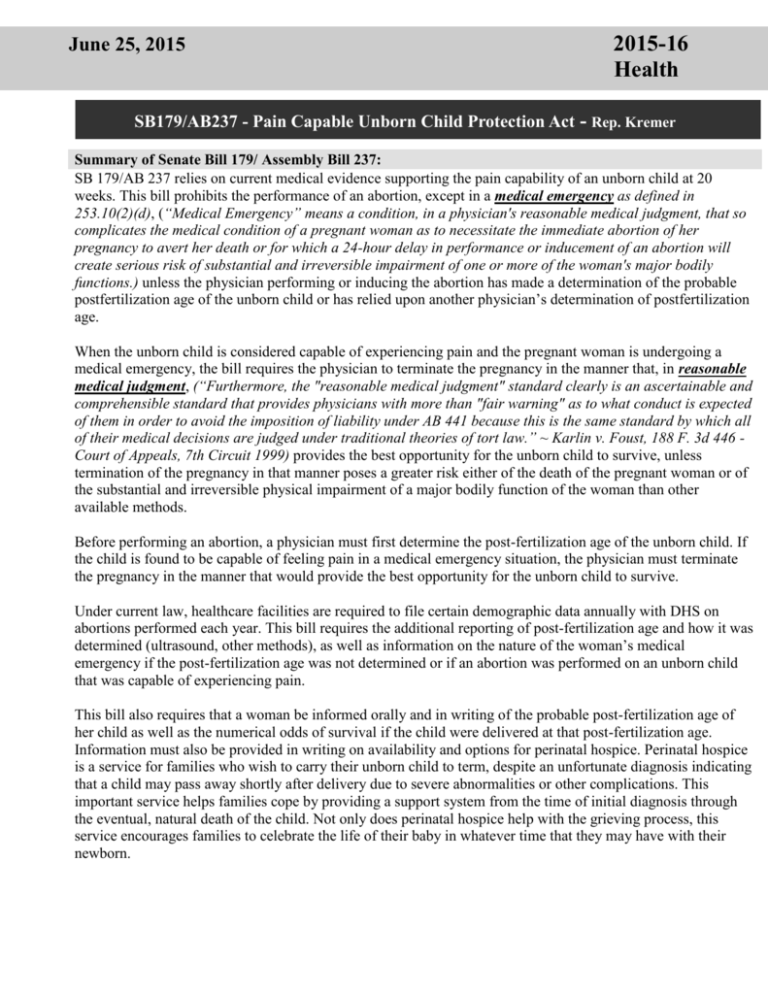
2015-16 Health June 25, 2015 SB179/AB237 - Pain Capable Unborn Child Protection Act - Rep. Kremer Summaries Summary of Senate Bill 179/ Assembly Bill 237: SB 179/AB 237 relies on current medical evidence supporting the pain capability of an unborn child at 20 weeks. This bill prohibits the performance of an abortion, except in a medical emergency as defined in 253.10(2)(d), (“Medical Emergency” means a condition, in a physician's reasonable medical judgment, that so complicates the medical condition of a pregnant woman as to necessitate the immediate abortion of her pregnancy to avert her death or for which a 24-hour delay in performance or inducement of an abortion will create serious risk of substantial and irreversible impairment of one or more of the woman's major bodily functions.) unless the physician performing or inducing the abortion has made a determination of the probable postfertilization age of the unborn child or has relied upon another physician’s determination of postfertilization age. When the unborn child is considered capable of experiencing pain and the pregnant woman is undergoing a medical emergency, the bill requires the physician to terminate the pregnancy in the manner that, in reasonable medical judgment, (“Furthermore, the "reasonable medical judgment" standard clearly is an ascertainable and comprehensible standard that provides physicians with more than "fair warning" as to what conduct is expected of them in order to avoid the imposition of liability under AB 441 because this is the same standard by which all of their medical decisions are judged under traditional theories of tort law.” ~ Karlin v. Foust, 188 F. 3d 446 Court of Appeals, 7th Circuit 1999) provides the best opportunity for the unborn child to survive, unless termination of the pregnancy in that manner poses a greater risk either of the death of the pregnant woman or of the substantial and irreversible physical impairment of a major bodily function of the woman than other available methods. Before performing an abortion, a physician must first determine the post-fertilization age of the unborn child. If the child is found to be capable of feeling pain in a medical emergency situation, the physician must terminate the pregnancy in the manner that would provide the best opportunity for the unborn child to survive. Under current law, healthcare facilities are required to file certain demographic data annually with DHS on abortions performed each year. This bill requires the additional reporting of post-fertilization age and how it was determined (ultrasound, other methods), as well as information on the nature of the woman’s medical emergency if the post-fertilization age was not determined or if an abortion was performed on an unborn child that was capable of experiencing pain. This bill also requires that a woman be informed orally and in writing of the probable post-fertilization age of her child as well as the numerical odds of survival if the child were delivered at that post-fertilization age. Information must also be provided in writing on availability and options for perinatal hospice. Perinatal hospice is a service for families who wish to carry their unborn child to term, despite an unfortunate diagnosis indicating that a child may pass away shortly after delivery due to severe abnormalities or other complications. This important service helps families cope by providing a support system from the time of initial diagnosis through the eventual, natural death of the child. Not only does perinatal hospice help with the grieving process, this service encourages families to celebrate the life of their baby in whatever time that they may have with their newborn. Fiscal Effect: The Department of Administration (DOA) fiscal estimate is indeterminate due to the unknown amount of cases that may be prosecuted. The Department of Health Services (DHS) estimates that AB 237 will increase costs due to training, printing and staff time to update reporting requirements and provide information on perinatal hospice. The fiscal impact is a one-time estimated cost of $45,500 that can be absorbed into the agency’s budget. The Department of Correction’s (DOC) fiscal estimate is indeterminate due to the unknown amount of individuals that may be sentenced under the bill. The Department of Justice’s (DOJ) fiscal estimate is indeterminate. Supporters Message: Wisconsin has a compelling interest to protect unborn children from feeling pain. By no later than the 20th week of pregnancy, an unborn child is fully equipped to feel and react to pain. Methods designed to intentionally terminate life at this stage of pregnancy cause significant physical harm to the unborn child and are cruel and unusual punishment. Legislators must act to protect unborn children from intensely painful elective abortion procedures. The life of the mother and the unborn child are of equal importance as evidenced in the language in the bill: When the unborn child is considered capable of experiencing pain and the pregnant woman is undergoing a medical emergency, the physician shall terminate the pregnancy in the manner that, in reasonable medical judgment, provides the best opportunity for the unborn child to survive, unless the termination of the pregnancy in that manner poses a greater risk either of the death of the pregnant woman or of the substantial and irreversible physical impairment of a major bodily function of the woman than other available methods. Opponents Message: This bill interferes with the physician-patient relationship, and because it references “postfertilization;” a term not commonly used to determine the age of an unborn child. (WI Academy of Family Physicians) No exceptions for victims of rape to obtain abortions after 20 weeks. (WI Coalition Against Sexual Assault) Key Supporters: Rep. Kremer and Sen. Lazich (authors); Rep. Joan Ballweg and Rep. Joe Sanfelippo (co-authors), Sens. S. Fitzgerald, Farrow, Gudex, LeMahieu, Moulton, Nass, Roth, Stroebel, Vukmir and Wanggaard; Reps. Allen, Craig, Edming, Gannon, Horlacher, Hutton, Kapenga, Katsma, Kleefisch, Kuglitsch, Kulp, Murphy, Petersen, Quinn, Rohrkaste, Skowronski, Tittl and Vorpagel, Wisconsin Right to Life, Wisconsin Catholic Conference Key Opponents: Planned Parenthood Advocates of Wisconsin, Medical College of Wisconsin., Wisconsin Medical Assoc., Wisconsin Assoc. of Local Health Departments and Boards, American Civil Liberties Union Committee Vote: On June 4, 2015, the Senate Committee on Health and Human Services passed SB 179 on a 3-2 vote. (The State Senate passed SB 179 with a 19-14 vote on June 9, 2015.) Staff Author of Bill Summary Jackie Arthur; Office of Rep. Jesse Kremer (6-9175)
